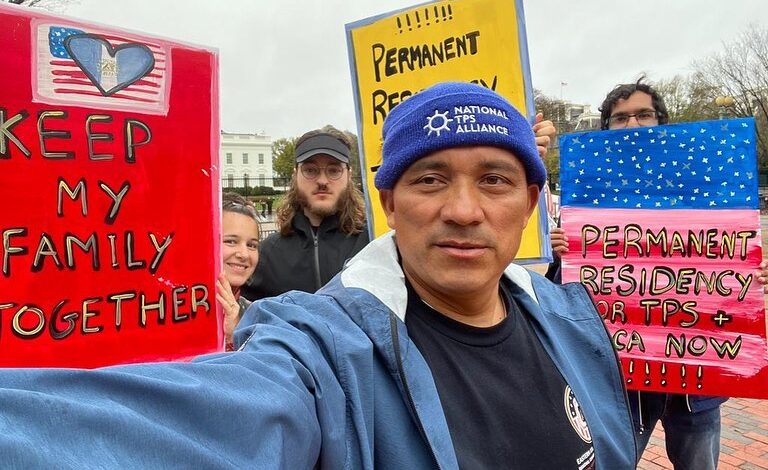The Unitarian Universalist Service Committee advances human rights through grassroots collaborations.
Biden Must Stop Contradicting Himself on Migrant Justice

By UUSC Staff on November 14, 2022
The Biden administration’s policies this past year are enough to give migrating people and their allies emotional whiplash. One minute, the administration is seeking to end the Title 42 anti-asylum policy in the courts; the next, they are expanding it. One day, we are cheering the extension of temporary protected status (TPS) for Haitians and other people whose home countries are facing humanitarian crisis; the next, the White House floats proposals to jail Haitian refugees at Guantanamo Bay. What is going on? Let’s take each of these in turn.
As we know, the Biden administration is currently in court trying to end Title 42—the Trump-imposed policy that shut down U.S. asylum processing under the pretext of responding to the pandemic. After the CDC decided to end the policy in May, far-right state governments (who aren’t otherwise known for trying to defend pandemic-era public health restrictions) intervened to prop up Title 42 as part of their wide-ranging effort to limit asylum at all costs.
The Biden administration is (in theory) defending the CDC’s decision, which means they are litigating to overturn the right-wing court order forcing them to reinstate Title 42. But, even as their lawyers are supposedly working to end the anti-asylum policy in court, the White House is actively working to expand it in practice!
Ever since they took office, the Biden team has used Title 42 to turn away asylum-seekers at the border. There was generally an exception, however, for Venezuelans and a few other nationalities, because Mexico would not accept them back as expellees from the United States. This all changed last month, however, when the administration engineered a new deal with Mexico and abruptly shut down asylum access for Venezuelan refugees as well.
The administration presented this new policy as a form of temporary parole for a subset of Venezuelans who have prior connections in the United States. The reverse side of the new “parole” for the fortunate few, however, was that Venezuelan refugees who did not qualify (or who sought asylum directly at the border or between ports of entry, which they are supposed to be allowed to do under the law) would now be expelled summarily under Title 42. This means they would be sent to Mexico without any access to their internationally-protected asylum rights or even a chance to plead their case. The result of this policy change has been a vast expansion in the reach of Title 42, and even the cruel separation of some Venezuelan families caught on opposite sides of the border.
How can the same administration that supposedly wants to end Title 42 justify using it to expel even more asylum-seekers to danger? The Department of Homeland Security points to the court order as an excuse, but as advocates and journalists have pointed out, the order only requires the administration to continue Title 42 in its previous form. It says nothing about expanding it in order to exclude even more nationalities!
Meanwhile, the administration’s recent decisions on Temporary Protected Status (TPS) display the same inconsistency and lack of principle. On the one hand, we welcome the news that the administration has chosen to extend TPS for immigrants from six countries—including Haiti—that are experiencing humanitarian crisis. This means that people from these countries who currently have TPS will be shielded from deportation for another eighteen months.
But even as we applaud this humane and common-sense decision, the administration is otherwise contradicting the very principles on which it is based. The administration acted to extend TPS, after all, largely because of a looming deadline in a court case filed by TPS holders challenging the Trump administration’s discriminatory attempt to deprive them of status. And while the Biden administration’s decision to extend their status offers much-needed relief, the administration is meanwhile arguing against the TPS holders in court!
Moreover, even as the administration recognizes the humanitarian conditions justifying TPS for Haiti and other countries, they are working to expel or detain people who have fled from those same conditions. TPS only covers immigrants who can prove they were inside the United States as of the date of the last designation, after all. It does not protect newly-arriving asylum-seekers from those countries, whom the administration is still blocking and expelling under Title 42. Most disturbingly of all, the administration is reportedly now also considering using Guantanamo to detain Haitian asylum-seekers—which would repeat an ugly and racist chapter of recent history, when the U.S. government previously used the offshore facility to intercept and detain Haitian refugees in an effort to prevent them from reaching U.S. shores.
It’s hard to detect any method or coherent principle behind this muddle, apart from a reactive and short-sighted response to political pressures. If there is not much consistency in the administration’s see-sawing on migrant justice, however, one thing remains unwavering: our partners’ commitment to seek justice for people in migration, without anti-Blackness, racism, or any other form of discrimination.
When the government fails to protect people’s rights, our partners keep fighting. And when the administration does eventually do the right thing, it is generally because the advocacy of our partners and other directly-affected communities made it happen. As Concepcion Morales, a member of our partners the National TPS Alliance, put it in response to the administration’s decision to extend TPS, “this was made possible, not by lobbyists, not by intermediaries, not by any U.S. politician, or politician from any TPS country. This is a direct result of TPS migrant families who organized and fought back, those who for years have marched the streets of Washington DC and the halls of Congress to make their voices heard.” We will continue to work in solidarity with their efforts, until the government consistently applies the human rights principles it is obliged to uphold.
Image Credit: The National TPS Alliance

